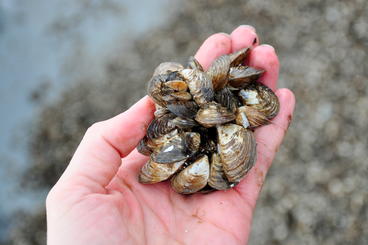
Principal Investigator(s):
- Jason Bried (Illinois Natural History Survey, Prairie Research Institute, University of Illinois at Urbana-Champaign)
Co-Investigator(s):
- Chloe Wardropper
- Trent Ford
Cooperator/Partner(s):
- Claire Beck (Ohio Department of Natural Resources)
- Molly Woloszyn (NOAA)
- Karen Terwilliger (Terwilliger Consulting Inc.)
- Ryan Sriver (University of Illinois at Urbana-Champaign)
- Tyler Schartel (University of Illinois at Urbana-Champaign)
- Chris Taylor (University of Illinois at Urbana-Champaign)
- Luke Jacobus (Purdue University)
- Ed DeWalt (University of Illinois at Urbana-Champaign)
- David Houghton (Hillsdale College)
- Phillip Hogan (University of Illinois at Urbana-Champaign)
- Kris Stepenuck (University of Vermont)
- Duane Friend (University of Illinois at Urbana-Champaign)
- Danelle Haake (National Great Rivers Research and Education Center)
- Becca Dymzarov (Rock River Coalition)
The Midwest United States is facing wetter winters and springs and more variable precipitation in the summer and fall. Heavy floods and prolonged droughts are costly to agriculture, housing, transportation infrastructure, and recreational opportunities across the region. These extremes also stress the health of freshwater ecosystems that are important to the regional economy and quality of life. The number of freshwater invertebrates like mussels, crayfish, and aquatic insects are generally declining which strongly indicates declining freshwater health. Losing these animals limits benefits such as water purification, food for wildlife, and aesthetic values.
This project seeks to understand and synthesize information about how freshwater invertebrates across the Midwest are responding to more intense and more variable precipitation extremes, and how they are predicted to respond in the future. Some of this information resides with people who are knowledgeable and concerned about these animals and some is contained within basic data on where species occur, and whether they possess characteristics that allow them to respond to precipitation change. Outputs from this project include useable datasets about the location and traits of species, maps of species locations and diversity under different precipitation change scenarios, and educational materials for volunteer freshwater biomonitoring programs.
The information about freshwater invertebrates and climate extremes from this project can help scientists, managers, and community volunteers assess the quality of freshwater resources and better protect these animals and the critical services they provide.
Read more from CASC Project Explorer.
